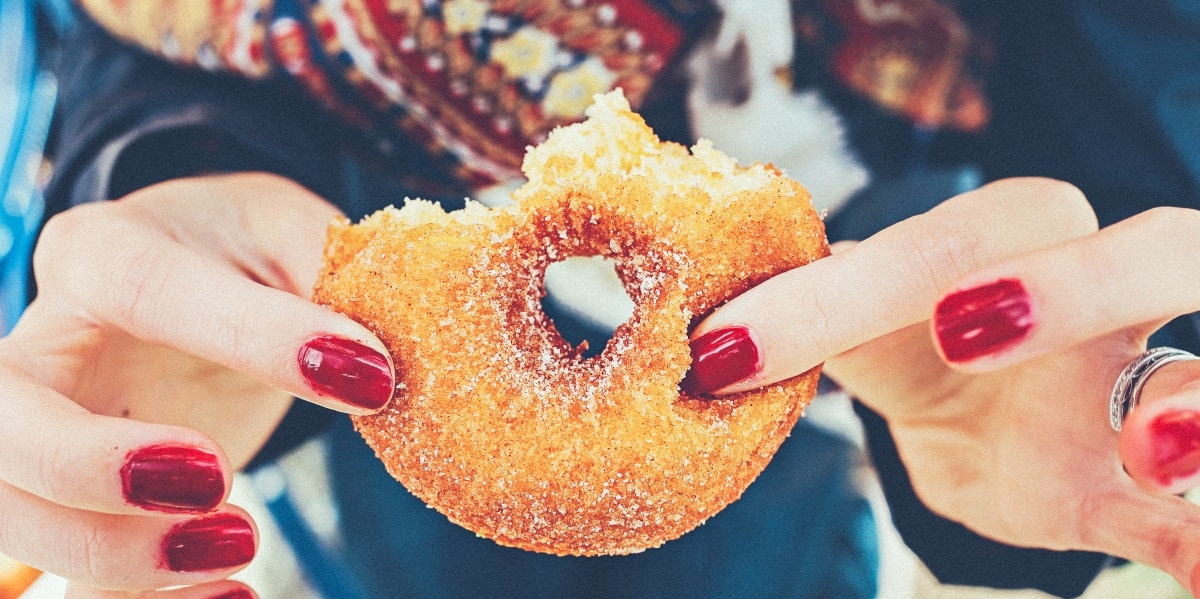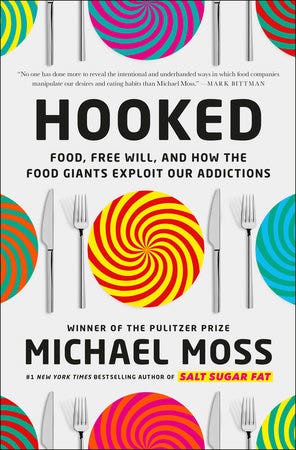New Book Insists Junk Food Is More Addictive Than Crack — And The Food Industry Is To Blame
Though not everyone agrees...
 Shutterstock
Shutterstock Nothing gets the brain fired up quite like delicious processed food — things like bags of chips or boxes of cookies. According to author Michael Moss, apparently not even crack cocaine lights up our brains in the same way.
The comparison may seem ludicrous, but when you delve into the science behind addiction, Moss maintains that the truth about our diets is more horrifying than we expect.
These findings frame a large portion of Hooked by investigative journalist and best-selling author Michael Moss, who has spent 10 years digging into the darker corners of the food industry in order to uncover some of the hidden truths about what is in our food.
The author makes a case for an entire cultural shift in how we view processed foods and those who manufacture them — including putting an end to shaming people for their individual dietary choices.
The book also petitions for a rethinking of food addiction, which is a controversial topic within the medical and psychological fields.
For instance, Susan McQuillan M.S., RDN, shares that some experts "question the idea that indulging in such food cravings has any connection to any known neurological or biological abnormalities that contribute to substance abuse disorders; rather, they say, it could be a problem with impulsivity and self-regulation."
However, understanding processed food within the framework of addiction may offer us new ways to understand our relationship with these foods.
RELATED: 10 Shameful Myths About Fat Women And Obesity That You've Probably Always Believed
It's imperative that we compassionately examine how our relationship with food impacts our well-being and the health of our society — without targeting fat people or individuals with eating disorders.
To learn more, we spoke to Moss about his new book and what he wants his readers to know about processed foods.
Moss believes processed food can be more addictive than drugs
Moss reveals in his book that no other substance excites the brain as quickly as processed food. This is one of the key indicators of the addictive nature of a substance.
Like drugs, cigarettes, or alcohol, processed foods can hit your brain’s reward circuit in seconds, leaving you wanting more and more.
“There’s a huge mismatch between our genes, the history of our forebearers and the modern environment, including our food,” Moss tells us. Historically the things we now overconsume like sugar or salt were much more difficult to access and many of the additives we eat daily did not exist at all.
Moss spoke to several evolutionary biologists while researching for Hooked and was struck by their horror at how processed foods have accelerated our consumption to a level that our bodies can’t keep up with.
“By nature, we are drawn to eat and overeat,” he tells us. “But food companies have changed the nature of our food so dramatically in the last 50 years but we haven’t been able to catch up with that.”
Moss tells us a lot of the pushback against viewing foods as addictive comes from the perception that food addiction is a personal choice. But there's evidence that Moss is right about this.
“That’s one of the hallmarks of addiction, [addictive substances] don’t affect everyone,” he says, insisting that many can control their relationship with alcohol, cigarettes, or even drugs.
“The same is true of these food products. Some of us can reach into a bag of chips and have a handful and not feel compelled to eat the whole bag. But many of us can’t.”
This is rooted in a biological inability to police our own consumption of additives, but it also plays into some of the psychological aspects of addiction.
We also spoke to psychologist Lesley Goth, who specializes in eating disorder management, about some of the impacts of this.
“If people are turning to sugary foods to avoid, numb, or manage their emotional pain, sugar becomes the 'go-to' substance for relief,” she says. “We are pleasure-seeking beings and sugar fills that need, especially if we cope with deeper emotional issues through food.”
Moss believes wwe are not to blame for our food addiction
This joint awareness of the biological and psychological impacts of junk food creates a space for a new understanding of food addiction, binge eating, or overconsumption.
It’s not our fault. The burden of personal responsibility and self-blame is not applicable where processed food is involved. Moss wants this to be the main takeaway from his book.
“These products are so highly engineered and perfected to tap our basic instincts in a way that completely destroys our free will when it comes to making decisions about what and how much to eat.”
We have already acquired this understanding with drugs, cigarettes, and alcohol to the extent that we acknowledge them as being inherently bad or addictive. But we don’t yet maintain similar views on junk food.

Goth points out that people with food addictions and binge eating problems rarely binge on things like carrots and spinach because they don’t offer the same emotional response or dopamine hit as processed foods.
“[Junk food is] not really what the body wants. It's what the mind wants and thinks it needs to feel good.”
Moss insists food manufacturers control and censor information about products
Hooked makes a compelling case for us to be more skeptical of food manufacturers.
The book dives into some of the many ways that manufacturers have blocked consumers from accessing information about food, from shutting down research to buying out diet companies.
Moss’s perception is that these large processed food conglomerates already know and deliberately perpetuate the addictiveness of their food.
“I was really struck by how many insiders I met who didn’t eat their own products. In some cases because of the health consequences or for fear of losing control,” Moss says.
He tells us about meeting the general counsel of Philip Morris, one of the world’s largest cigarette parent companies, who previously owned several processed food brands including Oreos. Moss says the man was able to restrict himself to one cigarette a day but wouldn’t go near one Oreo for fear of losing control.
Moss recognizes that food processing companies are not philanthropies and they would argue that it is their job to make their products as desirable as possible.
“The problem is that they’re more hooked on using those additives and configurations of their products than we are on eating them so mere recognition on their parts isn’t enough to change things.”
We need a cultural shift in how we view processed food
So, how do we respond to this information? Do we boycott these companies entirely?
Moss says there are multiple shifts necessary to begin taking the power back into our own hands.
“We’ve been letting these companies tell us what to value in food and eating for so long now,” he says. Moss argues that there needs to be more transparency about the intangible, addictive ingredients in processed food.
“Maybe some of [the change] involves some nudging on the part of the government through taxes on junk food or warning labels or more effort put on making better food less expensive,” Moss says. He is also a big believer in education.
He says it starts with elementary schools growing gardens so that children can get excited about natural, unprocessed foods. Agricultural workers should be incentivized to grow more vegetables instead of just yielding corn or soy for processed foods.
He anticipates processed food going through a similar evolution to cigarettes. We will eventually become more aware of their detrimental effects, even though some will still choose to partake in their consumption.
But in general, we need to stop thinking of food as being only for a spike of short-lived joy and start thinking of long-term impacts.
Goth agrees. She doesn’t believe in restricting foods, but, instead in helping people make their own informed choices.
“Junk food would not be addictive if we were a society more willing to attach our heads to our bodies and learn to listen to what it needs. If that could happen, then a treat here or there all become something that is not ‘bad’ but something that can be enjoyed in a way that is not over-consumed.”
Alice Kelly is a writer living in Brooklyn, New York. Catch her covering all things social justice, news, and entertainment.

